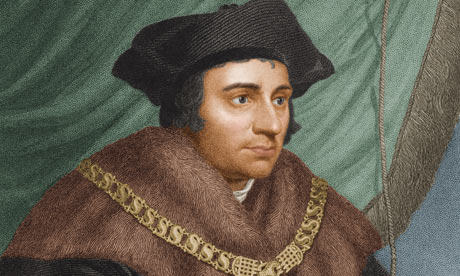All of a sudden Supreme Court judge Antonin Scalia decided to revive the crazymaking debate regarding the Fourteenth Amendment’s protection for women—or, apparently, lack thereof. … In any case, the original rationale for excluding women from the protections of the Fourteenth Amendment did not hold and has not ever held any water from the moment it was ratified until now. All of which brings us to the backstory of the Fourteenth Amendment, and to the thorny history of gender-neutral language in English.
My legal hero: Thomas More | Linda Lee | Law | guardian.co.uk
My legal hero: Thomas More
One-time lord chancellor’s principled defence of the rule of law is an ideal that all lawyers should aspire to, writes Linda Lee
Portrait of English lawyer, politician, and writer Thomas More (1478 – 1535) …
… While his legacy remains complex and academics continue to dissect his work and argue over what Thomas More wrote, thought and represented in the heady political, religious and social context of the 15th and 16th centuries, I admire him for that most fundamental of things; his passion for, and commitment to, the rule of law.
Although it has been suggested his most famous work, Utopia, is a sustained satire on the rule of law, I choose to take from it the deep affinities between the rule of law and humanism. In fact, it has been said that More was the “most human” of lawyers. …
Linda Lee has been president of the Law Society since July 2010


